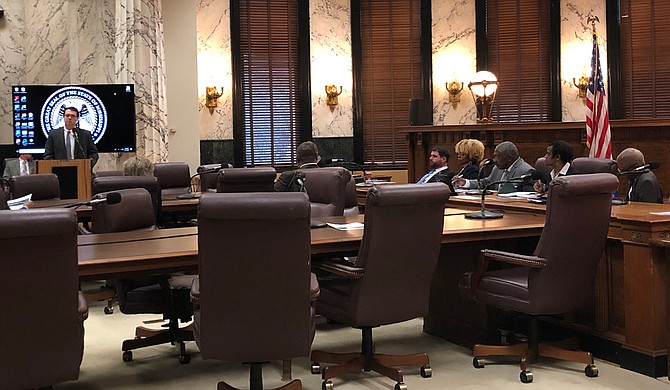James Robertson of Empower Mississippi presented several policy recommendations to the Mississippi Senate Labor Committee during its Jan. 11 hearing on initiatives to support formerly incarcerated people seeking employment. Photo by Seyma Bayram
Formerly incarcerated Mississippians who are entering the workforce continue to face obstacles to employment, advocates testified Tuesday at the Mississippi Capitol during a Senate Labor Committee hearing.
The hearing included a discussion of "Ban the Box," also called "Fair Chance Hiring," which prevents employers from requiring formerly incarcerated people to disclose felony convictions on job applications, and which Sen. John Horhn, D-Jackson, the chairman of the committee, supports.
Other suggested solutions included allowing people with convictions to obtain occupational licenses and eliminating the waiting period before Mississippians can apply for expungement of criminal records.
Jackie Turner, executive director of the Mississippi Department of Employment Security, revealed to the committee that the State of Mississippi's current seasonally adjusted unemployment rate is 4.7%—the lowest it has ever been. Despite the state's decreasing unemployment rate, though, Mississippi continues to experience a labor shortage.
James Robertson, the director of employability and criminal-justice reform for Empower Mississippi, attributed the state's struggling labor pool in part to Mississippi's incarceration rate, currently the third highest in the country. "Because of that, we have about 5,000 or 7,000 leaving our state correctional facilities every single year, with a felony conviction, coming back into our communities and being unable to find work," he said at the Feb. 11 hearing.
Robertson pointed out that while Mississippi's overall unemployment rate is low, unemployment rates for formerly incarcerated Mississippians is about five times higher, at 27%. Approximately 100,000 Mississippians currently have criminal records, he added. The state also has the lowest employment rate in the country for people between the ages of 25 to 54, which are considered prime ages for employment.
Federal law does not prevent employers from inquiring about an applicant's criminal history. Having to disclose a felony conviction on a job application not only can lead to discrimination, advocates say, but can also discourage those with convictions from even applying for a job in the first place.
At least 35 states have adopted "Ban the Box" legislation, as well as 150 cities and counties throughout the country, including Missouri, Georgia and Tennessee. It is not a blanket policy, but one whose rules and implementation vary according to where it is implemented. In some places, the policy requires employers to wait until the interview period to ask a person about their criminal record, but in others, companies may not be able to find out about a person's criminal record until they are ready to offer him or her a job.
"Ban the Box" does not deny an employer the ability to know the criminal record of prospective employees. Rather, it aims to eliminate barriers of social stigma against people with felonies, by deferring access to the criminal records until after applicants have had a fair opportunity to present themselves and their qualifications for the role, its advocates argue.
Robertson proposed additional policies to support formerly incarcerated Mississippians seeking employment, such as lifting restrictions on their ability to obtain occupational licenses. Last year, the Mississippi Senate passed Senate Bill 2871, also called the "Fresh Start Act," to allow people with convictions to obtain licenses for a small number of occupations. But licenses are required for more than 60 occupations in Mississippi, so Robertson urged lawmakers to consider expanding on the achievements of the 2019 bill.
Lastly, Robertson proposed eliminating the mandatory five-year waiting period before Mississippians with non-violent offenses can apply for expungement under House Bill 1352, which passed last year.
"Mississippi is more restrictive than other states," Robertson said of the five-year requirement. "The issue we see a lot of folks encountering is that most people who are released from prison have some amount of time to serve on parole or probation, after their release, and that can be up to five years. So when you tack a five-year waiting period on the end of that, a lot of folks aren't even eligible to apply for expungement until they've been in the community for a decade."
Employers stand to benefit from taking a chance on formerly incarcerated Mississippians, some who testified argued. Employers can apply for fidelity bonds through the U.S. Department of Labor for hiring formerly incarcerated citizens, Turner said. They are also eligible for federal income-tax credits through the Work Opportunity Tax Credit Program, Robertson added.
At the hearing, Mississippi State Penitentiary at Parchman Chaplain Marvin Edwards, who also heads the Mississippi Association for Returning Citizens, emphasized the importance of supporting formerly incarcerated people in the workforce.
"One of the biggest hardships for these guys when they're re-entering society is finding a job," he said.
Follow City Reporter Seyma Bayram on Twitter @SeymaBayram0. Send story tips to [email protected].
More stories by this author
- City Announces Robinson Road Repaving Project; Stay-At-Home Order Still in Effect
- City of Jackson Sues Canadian National Railway Over Blocked Railroad Underpass
- Mayor Lumumba Revises, Extends Jackson Stay-at-Home Order
- Mississippi Justice Institute Sues Mayor Lumumba for Open-Carry Order
- Jackson Attorney with COVID: ‘A False Sense of Protection Here’


